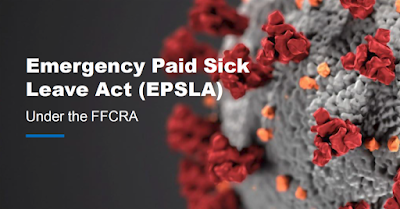16 STATES, PLUS WASHINGTON,
D.C., HAVE PAID SICK LEAVE POLICIES
Below is a synopsis of Paid Sick Leave (“PSL”)
statutes throughout United States. It is
only a summary intended as a guide, and those seeking additional information
should click the links and/or consult legal counsel in your jurisdiction.
Note: Employers are always allowed to exceed municipal,
state or federal law requirements.
Note: Most jurisdiction discussed below have
carry over provisions; they are not discussed herein.
Primary Sources: FitSmallBusiness.com, SHRM & cited Articles, City and State
Statutes/Ordinances
Arizona, California, Colorado, Nevada and New Mexico All Have Paid Sick Leave Provisions
Arizona Paid Sick Leave
Law
Arizona’s Fair Wages and Healthy Families Act
requires employers <15 employees to provide 24 hours PSL a year. Companies with 15 or more workers must provide
40 hours per annum. Part-time employees earn one hour PSL per 30 hours worked.
California
Paid Sick
Leave Law
California’s Healthy Workplaces, Healthy Families Act of 2014 requires
ALL employers to provide 24 PSL per year.
Colorado Paid Sick Leave
Law
Colorado’s Paid Sick Leave Law provides that, starting January 1, 2021, employers with 16 or more employees,
and starting January 1, 2022, all employers, must provide paid sick
leave to their employees, accrued at one hour of paid sick leave for every 30
hours worked, up to a maximum of 48 hours per year.
Five New England States- Connecticut, Massachusetts, Maine, Rhode Island and Vermont -
Have Paid Sick Leave Laws
Connecticut Paid Sick
Leave Law
Connecticut’s Paid Sick Leave Law requires employers
with 50 or more employees provide 40 hours PSL to full-time employees.
Part-time employees get PSL at the rate of one hour earned for every 40 hours
worked
Maine Paid Sick Leave
Law
Maine’s paid leave law provides
for 8 hours PSL for each month a full-time employee works. Part-time workers
get pro-rated PSL, so that an employee working 20 hours a week would accrue 4
hours PSL.
Maryland Paid Sick Leave
Law
Maryland’s Healthy Working
Families Act requires employers with 15 or more employees to grant sick
leave at a rate of one hour PSL per 30 hours worked, with a 40 hour per annum
maximum (employers with <15 employees must provide protected unpaid sick
leave).
See also: Montgomery County, Md. PSL Ordinances
Massachusetts Paid Sick
Leave Law
Massachusetts Earned Sick Time Law requires
companies with 11 or more employees to provide 40 hours PSL to full-time
employees. Part-time employees accrue one hour of PSL per 30 hours worked.
Michigan Paid Sick Leave
Law
Michigan’s Paid
Medical Leave Act governs companies with 50 or more employees, and
requires 1 hour of PSL per 35 hours worked per week
Nevada Paid Sick Leave
Law
Nevada’s paid sick leave covers
all employers that have 50 or more employees. An employee is entitled to 0.01923
hours of paid leave for each hour of work (that is ¾ an hour PSL for a 40 hour
work week), up to a maximum of 40 hours per year.
New Jersey and Big Brother New York Have Paid Sick Leave Laws
New Jersey Paid Sick
Leave Law
New Jersey requires paid leave policies from
all employers up irrespective of the number of employees. Employees earn at a
rate of one hour PSL per 30 hours worked, with a 40 hour per annum maximum.
New Mexico Paid Sick Leave Law
New Mexico’s Healthy
Workplaces Act was enacted on April 8, 2021 and will become effective
on July 1, 2022. It appears the
accrual rate will be 1 PSL per 30 hours worked, with an annual maximum of 64
hours.
New York Paid Sick Leave
Law
The New
York Paid Sick Leave Law requires PSL as follows:
Employers with 100 or more employees must provide up
to 56 hours of paid sick leave per calendar year.
Employers with 5 to 99 employees must provide up to 40 hours
of paid sick leave per calendar year.
Employers with 4 or fewer employees and net income of
greater than $1 million in the previous tax year are required to provide up to
40 hours of paid sick leave per calendar year.
Employers with 4 or
fewer employees and net income is $1 million or less in the previous tax year
are required to provide up to 40 hours of protected unpaid sick
leave per calendar year.
The rate of accrual is
one hour per PSL (or unpaid) per 30 hours worked.
See also: New York City and Westchester County PSL Ordinances
In the Pacific Northwest, Oregon and Washington Have Paid Sick Leave Laws
Oregon Paid Sick Leave Law
Oregon’s Sick Time Law requires PSL for employees of companies with 10 or more employees at a rate of one hour per PSL (or unpaid) per 30 hours worked, maximum of 40 per year. All employees of any sized company are entitled to protected unpaid sick leave.
See also: Portland PSL Ordinance
Rhode Island Paid Sick Leave Law
The Healthy and Safe Families and Workplaces Act requires employers with 18 or more employees will have to provide paid sick leave; employers with <18 workers must provide protected unpaid leave. The accrual rate is 1 hour PSL per 35 hours worked, maximum of 40 per annum. Unpaid leave accrues at the same rate.
Vermont Paid Sick Leave Law
Vermont’s Earned Sick Time Act mandates that employees working for employers with five or more employees accrue PSL at a rate of 1 hour per 52 hours worked, with a maximum of 40 hours per year.
Washington State Paid
Sick Leave Law
Washington state’s Paid Sick Leave
Law provides that PSL accrues at the rate of one hour for every 40
hours worked, up to maximum of 40 per year. There are exemptions for supervisors
and some professionals.
See also: Seattle and Tacoma PSL Ordinances
If You Work in Our Nation's Capital - You Get Paid Sick Leave
Washington D.C. Paid
Sick Leave Law
Washington D.C.’s Provision
of Paid Leave has a tiered
approach based on company size.
Employers with 100 or more employees must
provide 1 hour PSL for every 37 hours worked, maximum of 56 hours per
year.
Employers with 25-99 employees must provide 1
hour PSL for every 43 hours worked, maximum of 40 hours per year.
Employers with <25
employees must provide 1 hour PSL for every 87 hours worked, maximum of 24
hours per year.
You May Also Find Worthwhile:These Major Cities Have Mandatory Paid Sick Leave Laws
These 34 States Do Not Have Any Mandatory Paid Sick Leave Laws
Is There a Federal Law That Requires That Employees Receive Vacation, be Paid Holiday or Sick Pay or be Given Break, Rest or Meal Time?
The Minimum Wage Rate in Each State - States With Highest and Lowest Minimum Wage Rate
How Do the Families First Coronavirus Act ("FFCRA"), the Emergency Paid Sick Leave Act ("EPSLA") and the Fair Labor Standards Act ("FLSA") Work Together? Toro v. Acme Barricades (M.D. Fl. 2021) - Covid-19 Paid Sick Leave and Retaliation Case (Posted April 16, 2021)
Covid Case of the Week - Kofler v. Sayde Steeves Cleaning Service, Inc. - Termination of Employee Seeking FFCRA Leave a Violation of Anti-Retaliation Provisions of FLSA (Posted April 9, 2021)
Covid Case of The Week - Wage and Hour Claims Added to Retaliation Claim - Aguayo v. Shield N Seal (Posted April 3, 2021)
















